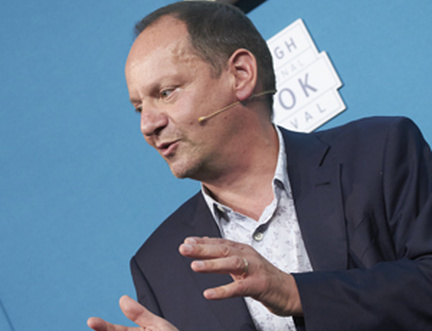More articles Sunday 21 August 2016 10:00pm
Philippe Sands Delivers Frederick Hood Memorial Lecture

Before 1945, states were absolutely sovereign. In other words, explained Philippe Sands QC in his fascinating and densely packed Book Festival event on international law, family secrets, and the extraordinary coincidences that led him to write his acclaimed memoir East West Street, states were entirely free to treat nationals as they wished. That all changed when Nazi war criminals were brought to trial in Nuremberg for the mass murder of Jews and our modern system of international justice was born. The dual concepts of “crimes against humanity” and “genocide” were invented “out of thin air” by two lawyers, Hersch Lauterpacht and Raphael Lemkin. The human rights of individuals and groups were enshrined in international law for the first time. It was “a revolutionary moment”, Sands explained, even if we know the painful truth that history repeats itself regardless. And now, he warned, “we are in danger of losing the lessons of Nuremberg.”
“I think we’ve forgotten,” continued the notoriously outspoken lawyer, "and the new generation has no connection with what happened." Otherwise how could the Tory government continue “shredding the Human Rights Act” and passing a vote to leave the EU? In an impassioned defence of the European Union, Sands said the point of it was to prevent crimes against humanity and genocide from happening. “You fix it,” he said of the flaws in the EU. “You don’t ditch it.”
Professor of Law at University College London and a highly respected barrister involved in many of the major human rights cases of our time, Sands spoke about Scotland’s key role at this moment in time. “Scotland has tremendous power,” he said, pointing to the fact that the first visit Theresa May scheduled as Prime Minister was to Scotland to meet Nicola Sturgeon. “There is everything to play for,” he urged his spellbound audience in a fiery call to resistance. “This is not the moment to be lying down. It has only just begun.”
In a powerful and thought-provoking session that switched between the personal and political, the present and the past, Sands revealed his own investment in story of Nuremberg. In East West Street, which took Sands seven years to write, he discovered links between Lauterpacht, Lemkin and his own Jewish family in a series of remarkable coincidences. His mother’s family, many of whom were murdered by the Nazis, hailed from the city of Lviv, then in occupied Poland. So did Lauterpacht and Lemkin. Lauterpacht’s son, in the future, would become Sands’ teacher (and neither of them would realise their connection for 30 years). Sands’ great grandmother was born on the same street - the East West Street of the book’s title - as Lauterpacht. And horrifically, both she and Lemkin’s parents were sent to their deaths on the same street leading to the Treblinka death camp.
It was also in Lviv that Hitler’s lawyer, Hans Frank, ordered the extermination of the Jews. Sands, who only began to research his family history after being invited to give a lecture on crimes against humanity and genocide in Lviv in 2010, discovered that Frank was the Nazi who issued the instruction to murder his grandfather’s family as well as the families of Lauterpacht and Lemkin.
Though his grandfather didn’t die until 1997, Sands noted, silence descended in his family and he simply knew not to open certain doors. It was the distance permitted by being his grandfather’s grandson, and not his son, that eventually led him to request to see his grandfather’s papers: “two little suitcases containing his expulsion order from Austria and Nazi passport”. The door to Sands’ imagination was opened. The consequences of history, he said eloquently, “travelled down the generations, and it doesn’t just stop because it isn’t discussed.” James Runcie, who expertly chaired the event and was at Cambridge with Sands, asked him whether he had become a different lawyer as a result of writing the book. “I have become a better person,” Sands replied without hesitation.

 Major new partnership with Celtic Connections
Major new partnership with Celtic Connections 

